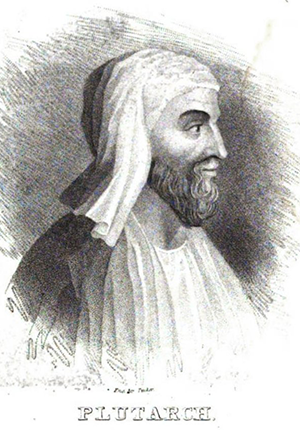Historic Document
Parallel Lives of the Noble Greeks and Romans (ca. 100)
Plutarch | Unknown

Public domain
Summary
Plutarch of Chaeronea (46-119 or soon thereafter) was author of a series of brief biographies devoted to the lives of the Roman emperors from Augustus to Vitellius, a work that is for the most part lost; of a series of essays collected in what is called the Moralia; and of the Parallel Lives of the Noble Greeks and Romans, which is for the most part extant. Although his literary efforts made him a celebrity in the Roman empire, Plutarch remained in the city of his birth. There, he held various magistracies, and for three decades he served as a priest at the temple of Apollo at nearby Delphi. His Parallel Lives was the book which Americans read most avidly in the revolutionary period, and it was this work, above all others, that informed their understanding of the classical Greek democracies and oligarchies, of the Roman republic, and of the role attributed to their founders – among them the legendary Lycurgus of Sparta and the Athenian lawgiver Solon.
Selected by

Paul Rahe
Professor of History and Charles O. Lee and Louise K. Lee Chair in the Western Heritage at Hillsdale College

Jeffrey Rosen
President and CEO, National Constitution Center

Colleen A. Sheehan
Professor of Politics at the Arizona State University School of Civic and Economic Thought and Leadership
Document Excerpt
Selections from the Life of Lycurgus
Things being in this posture at his return, [Lycurgus] applied himself, without loss of time, to a thorough reformation, and resolved to change the whole face of the commonwealth; for what could a few particular laws and a partial alteration avail? He must act as wise physicians do, in the case of one who labors under a complication of diseases, by force of medicines reduce and exhaust him, change his whole temperament, and then set him upon a totally new regimen of diet. Having thus projected things, away he goes to Delphi to consult Apollo there; which having done, and offered his sacrifice, he returned with that renowned oracle, in which he is called beloved of God, and rather God than man; that his prayers were heard, that his laws should be the best, and the commonwealth which observed them the most famous in the world. Encouraged by these things, he set himself to bring over to his side the leading men of Sparta, exhorting them to give him a helping hand in his great undertaking; he broke it first to his particular friends, and then by degrees gained others, and animated them all to put his design in execution. . . .
Amongst the many changes and alterations which Lycurgus made, the first and of greatest importance was the establishment of the senate, which, having a power equal to the kings’ in matters of great consequence, and, as Plato expresses it, allaying and qualifying the fiery genius of the royal office, gave steadiness and safety to the commonwealth. For the state, which before had no firm basis to stand upon, but leaned one while towards an absolute monarchy, when the kings had the upper hand, and another while towards a pure democracy, when the people had the better, found in this establishment of the senate a central weight, like ballast in a ship, which always kept things in a just equilibrium; the twenty-eight always adhering to the kings so far as to resist democracy, and, on the other hand, supporting the people against the establishment of absolute monarchy. . . .
The people then being thus assembled in the open air, it was not allowed to any one of their order to give his advice, but only either to ratify or reject what should be propounded to them by the king or senate. But because it fell out afterwards that the people, by adding or omitting words, distorted and perverted the sense of propositions, kings Polydorus and Theopompus inserted into the Rhetra, or grand covenant, the following clause: “That if the people decide crookedly, it should be lawful for the elders and leaders to dissolve;” that is to say, refuse ratification, and dismiss the people as depravers and perverters of their counsel. . . .
After the creation of the thirty senators, his next task, and, indeed, the most hazardous he ever undertook, was the making a new division of their lands. For there was an extreme inequality amongst them, and their state was overloaded with a multitude of indigent and necessitous persons, while its whole wealth had centered upon a very few. To the end, therefore, that he might expel from the state arrogance and envy, luxury and crime, and those yet more inveterate diseases of want and superfluity, he obtained of them to renounce their properties, and to consent to a new division of the land, and that they should live all together on an equal footing; merit to be their only road to eminence, and the disgrace of evil, and credit of worthy acts, their one measure of difference between man and man. . . .
The third and most masterly stroke of this great lawgiver, by which he struck a yet more effectual blow against luxury and the desire of riches, was the ordinance he made, that they should all eat in common, of the same bread and same meat, and of kinds that were specified, and should not spend their lives at home, laid on costly couches at splendid tables, delivering themselves up into the hands of their tradesmen and cooks, to fatten them in corners, like greedy brutes, and to ruin not their minds only but their very bodies, which, enfeebled by indulgence and excess, would stand in need of long sleep, warm bathing, freedom from work, and, in a word, of as much care and attendance as if they were continually sick.
Selections from the Life of Solon
Yet, though he refused the government, [Solon] was not too mild in the affair; he did not show himself mean and submissive to the powerful, nor make his laws to pleasure those that chose him. For where it was well before, he applied no remedy, nor altered any thing, for fear lest, “Overthrowing altogether and disordering the state, he should be too weak to new-model and recompose it to a tolerable condition”; but what he thought he could effect by persuasion upon the pliable, and by force upon the stubborn, this he did, as he himself says, “With force and justice working both in one.” And, therefore, when he was afterwards asked if he had left the Athenians the best laws that could be given, he replied, “The best they could receive.” . . .
Solon . . . called cancelling debts Seisacthea, a relief, or disencumbrance. For the first thing which he settled was, that what debts remained should be forgiven, and no man, for the future, should engage the body of his debtor for security. . . . In this he pleased neither party, for the rich were angry for their money, and the poor that the land was not divided, and, as Lycurgus ordered in his commonwealth, all men reduced to equality. . . .
Soon, however, becoming sensible of the good that was done, they laid by their grudges, made a public sacrifice, calling it Seisacthea, and chose Solon to new-model and make laws for the commonwealth, giving him the entire power over every thing, their magistracies, their assemblies, courts, and councils; that he should appoint the number, times of meeting, and what estate they must have that could be capable of these, and dissolve or continue any of the present constitutions, according to his pleasure. . . . Solon, being willing to continue the magistracies in the hands of the rich men, and yet receive the people into the other part of the government, took an account of the citizens’ estates, and those that were worth five hundred measures of fruits, dry and liquid, he placed in the first rank, calling them Pentacosiomedimni; those that could keep an horse, or were worth three hundred measures, were named Hippada Teluntes, and made the second class; the Zeugitæ, that had two hundred measures, were in the third; and all the others were called Thetes, who were not admitted to any office, but could come to the assembly, and act as jurors; which at first seemed nothing, but afterwards was found an enormous privilege, as almost every matter of dispute came before them in this latter capacity. Even in the cases which he assigned to the archons’ cognizance, he allowed an appeal to the courts.
Selections from the Life of Cicero
For [Cicero] beyond all others showed the Romans how great a charm eloquence adds to the right, and that justice is invincible if it is correctly put in words, and that it behooves the careful statesman always in his acts to choose the right instead of the agreeable, and in his words to take away all vexatious features from what is advantageous. A proof of the charm of his discourse may be found in an incident of his consulship connected with the public spectacles. In earlier times, it seems, the men of the equestrian order were mingled with the multitudes in the theatres and saw the spectacles along with the people, seated as chance would have it; Marcus Otho was the first to separate in point of honour the knights from the rest of the citizens, which he did when he was praetor, and gave them a particular place of their own at the spectacles, which they still retain. The people took this as a mark of dishonour to themselves, and when Otho appeared in the theatre they hissed him insultingly, while the knights received him with loud applause. The people renewed and increased their hisses, and then the knights their applause. After this they turned upon one another with reviling words, and disorder reigned in the theatre. When Cicero heard of this he came and summoned the people to the temple of Bellona, where he rebuked and exhorted them, whereupon they went back again to the theatre and applauded Otho loudly, and vied with the knights in showing him honour and esteem. . . .
So at this time Cicero had the greatest power in the state, but he made himself generally odious, not by any base action, but by continually praising and magnifying himself, which made him hateful to many. For there could be no session either of senate or assembly or court of justice in which one was not obliged to hear Catiline and Lentulus endlessly talked about. Nay, he even went so far as to fill his books and writings with these praises of himself; and he made his oratory, which was naturally very pleasant and had the greatest charm, irksome and tedious to his hearers, since this unpleasant practice clung to him like a fatality. But nevertheless, although he cherished so strong an ambition, he was free from envying others, since he was most ungrudging in his encomiums upon his predecessors and contemporaries, as may be gathered from his writings. . . .
[B]ut it was Cicero’s hatred for Antony in the first place, and then his natural craving for honour, that attached him to the young Caesar, since he thought to add Caesar’s power to his own political influence. And indeed the young man carried his court to him so far as actually to call him father. At this Brutus was very angry, and in his letters to Atticus attacked Cicero, saying that in paying court to Caesar through fear of Antony he was plainly not obtaining liberty for his country, but wooing a kind master for himself. However, Brutus took up Cicero’s son who was studying philosophy at Athens, gave him a command, and achieved many successes through his instrumentality.
Cicero’s power in the city reached its greatest height at this time, and since he could do what he pleased, he raised a successful faction against Antony, drove him out of the city, and sent out the two consuls, Hirtius and Pansa, to wage war upon him, while he persuaded the senate to vote Caesar the lictors and insignia of a praetor, on the ground that he was fighting in defence of the country. But after Antony had been defeated, and, both consuls having died after the battle, the forces had united under Caesar, the senate became afraid of a young man who had enjoyed such brilliant good fortune, and endeavoured by honours and gifts to call his troops away from him and to circumscribe his power, on the ground that there was no need of defensive armies now that Antony had taken to flight. Under these circumstances Caesar took alarm and secretly sent messages to Cicero begging and urging him to obtain the consulship for them both, but to manage affairs as he himself thought best, after assuming the office, and to direct in all things a youthful colleague who only craved name and fame. And Caesar himself admitted afterwards that it was the fear of having his troops disbanded and the danger of finding himself left alone which led him to make use in an emergency of Cicero’s love of power, by inducing him to sue for the consulship with his co-operation and assistance in the canvass.




